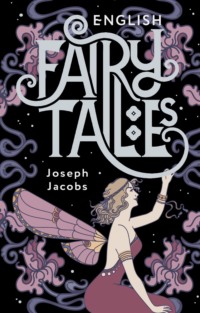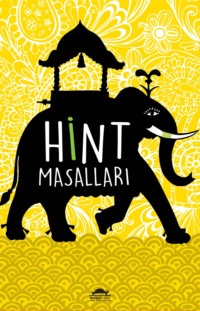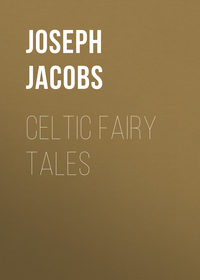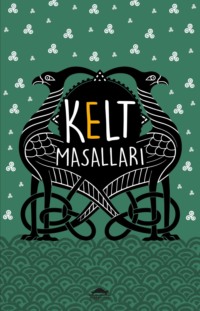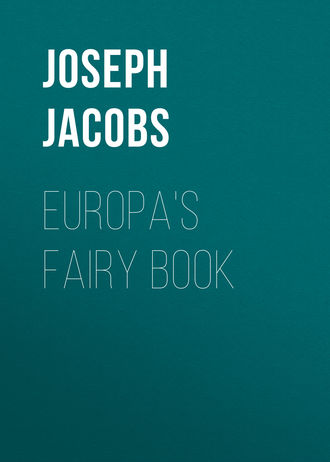 полная версия
полная версияEuropa's Fairy Book

Joseph Jacobs
Europa's Fairy Book
My Dear Little Peggy:—
Many, many, many years ago I wrote a book for your Mummey—when she was my little May—telling the fairy tales which the little boys and girls of England used to hear from their mummeys, who had heard them from their mummeys years and years and years before. My friend Mr. Batten made such pretty pictures for it—but of course you know the book—it has "Tom, Tit, Tot" and "The little old woman that went to market," and all those tales you like. Now I have been making a fairy-tale book for your own self, and here it is. This time I have told, again the fairy tales that all the mummeys of Europe have been telling their little Peggys, Oh for ever so many years! They must have liked them because they have spread from Germany to Russia, from Italy to France, from Holland to Scotland, and from England to Norway, and from every country in Europe that you will read about in your geography to every other one. Mr. Batten, who made the pictures for your mummey's book, has made some more for yours—isn't it good of him when he has never seen you?
Though this book is your very, very own, you will not mind if other little girls and boys also get copies of it from their mummeys and papas and ganmas and ganpas, for when you meet some of them you will, all of you, have a number of common friends like "The Cinder-Maid," or "The Earl of Cattenborough," or "The Master-Maid," and you can talk to one another about them so that you are old friends at once. Oh, won't that be nice? And when one of these days you go over the Great Sea, in whatever land you go, you will find girls and boys, as well as grown-ups, who will know all of these tales, even if they have different names. Won't that be nice too?
And when you tell your new friends here or abroad of these stories that you and they will know so well, do not forget to tell them that you have a book, all of your very own, which was made up specially for you of these old, old stories by your old, old
Ganpa.P.S.—Do you hear me calling as I always do, "Peggy, Peggy"? Then you must answer as usual, "Ganpa, Ganpa."
PREFACE
Ever since—almost exactly a hundred years ago—the Grimms produced their Fairy Tale Book, folk-lorists have been engaged in making similar collections for all the other countries of Europe, outside Germany, till there is scarcely a nook or a corner in the whole continent that has not been ransacked for these products of the popular fancy. The Grimms themselves and most of their followers have pointed out the similarity or, one might even say, the identity of plot and incident of many of these tales throughout the European Folk-Lore field. Von Hahn, when collecting the Greek and Albanian Fairy Tales in 1864, brought together these common "formulæ" of the European Folk-Tale. These were supplemented by Mr. S. Baring-Gould in 1868, and I myself in 1892 contributed an even fuller list to the Hand Book of Folk-Lore. Most, if not all of these formulæ, have been found in all the countries of Europe where folk-tales have been collected. In 1893 Miss M. Roalfe Cox brought together, in a volume of the Folk-Lore Society, no less than 345 variants of "Cinderella" and kindred stories showing how widespread this particular formula was throughout Europe and how substantially identical the various incidents as reproduced in each particular country.
It has occurred to me that it would be of great interest and, for folk-lore purposes, of no little importance, to bring together these common Folk-Tales of Europe, retold in such a way as to bring out the original form from which all the variants were derived. I am, of course, aware of the difficulty and hazardous nature of such a proceeding; yet it is fundamentally the same as that by which scholars are accustomed to restore the Ur-text from the variants of different families of MSS. and still more similar to the process by which Higher Critics attempt to restore the original narratives of Holy Writ. Every one who has had to tell fairy tales to children will appreciate the conservative tendencies of the child mind; every time you vary an incident the children will cry out, "That was not the way you told us before." The Folk-Tale collections can therefore be assumed to retain the original readings with as much fidelity as most MSS. That there was such an original rendering eminating from a single folk artist no serious student of Miss Cox's volume can well doubt. When one finds practically the same "tags" of verse in such different dialects as Danish and Romaic, German and Italian, one cannot imagine that these sprang up independently in Denmark, Greece, Germany, and Florence. The same phenomenon is shown in another field of Folk-Lore where, as the late Mr. Newell showed, the same rhymes are used to brighten up the same children's games in Barcelona and in Boston; one cannot imagine them springing up independently in both places. So, too, when the same incidents of a fairy tale follow in the same artistic concatenation in Scotland, and in Sicily, in Brittany, and in Albania, one cannot but assume that the original form of the story was hit upon by one definite literary artist among the folk. What I have attempted to do in this book is to restore the original form, which by a sort of international selection has spread throughout all the European folks.
But while I have attempted thus to restore the original substance of the European Folk-Tales, I have ever had in mind that the particular form in which they are to appear is to attract English-speaking children. I have, therefore, utilized the experience I had some years ago in collecting and retelling the Fairy Tales of the English Folk-Lore field (English Fairy Tales, More English Fairy Tales), in order to tell these new tales in the way which English-speaking children have abundantly shown they enjoy. In other words, while the plot and incidents are "common form" throughout Europe, the manner in which I have told the stories is, so far as I have been able to imitate it, that of the English story-teller.
I have indeed been conscious throughout of my audience of little ones and of the reverence due to them. Whenever an original incident, so far as I could penetrate to it, seemed to me too crudely primitive for the children of the present day, I have had no scruples in modifying or mollifying it, drawing attention to such Bowdlerization in the somewhat elaborate notes at the end of the volume, which I trust will be found of interest and of use to the serious student of the Folk-Tale.
It must, of course, be understood that the tales I now give are only those found practically identical in all European countries. Besides these there are others which are peculiar to each of the countries or only found in areas covered by cognate languages like the Celtic or the Scandinavian. Of these I have already covered the English and the Celtic fields, and may, one of these days, extend my collections to the French and Scandinavian or the Slavonic fields. Meanwhile it may be assumed that the stories that have pleased all European children for so long a time are, by a sort of international selection, best fitted to survive, and that the Fairy Tales that follow are the choicest gems in the Fairy Tale field. I can only express the hope that I have succeeded in placing them in an appropriate setting.
It remains only to thank those of my colleagues and friends who have aided in various ways in the preparation of this volume, though of course their co-operation does not, in the slightest, imply responsibility for or approval of the method of treatment I have applied to the old, old stories. Miss Roalfe Cox was good enough to look over my reconstruction of "Cinderella" and suggest alterations in it. Prof. Crane gave me permission to utilize the version of the "Dancing Water," in his Italian Popular Tales. Sir James G. Frazer looked through my restoration of the "Language of Animals," which was suggested by him many years ago; and Mr. E. S. Hartland criticized the Swan-Maiden story. I have also to thank my old friend and publisher, Dr. G. H. Putnam, for the personal interest he has taken in the progress of the book.
J. J.Yonkers, N. Y.
July, 1915.
THE CINDER-MAID
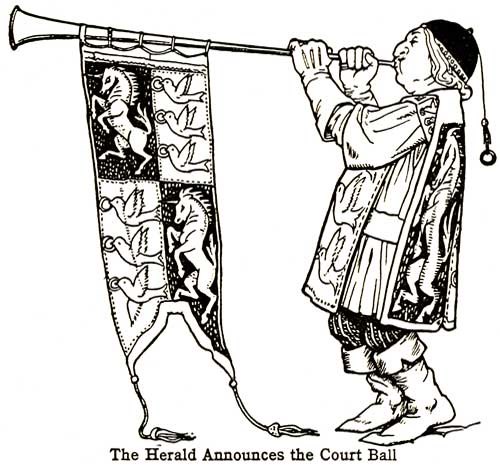
Once upon a time, though it was not in my time or in your time, or in anybody else's time, there was a great King who had an only son, the Prince and Heir who was about to come of age. So the King sent round a herald who should blow his trumpet at every four corners where two roads met. And when the people came together he would call out, "O yes, O yes, O yes, know ye that His Grace the King will give on Monday sennight"—that meant seven nights or a week after—"a Royal Ball to which all maidens of noble birth are hereby summoned; and be it furthermore known unto you that at this ball his Highness the Prince will select unto himself a lady that shall be his bride and our future Queen. God save the King."
Now there was among the nobles of the King's Court one who had married twice, and by the first marriage he had but one daughter, and as she was growing up her father thought that she ought to have some one to look after her. So he married again, a lady with two daughters, and his new wife, instead of caring for his daughter, thought only of her own and favoured them in every way. She would give them beautiful dresses but none to her step-daughter who had only to wear the cast-off clothes of the other two. The noble's daughter was set to do all the drudgery of the house, to attend the kitchen fire, and had naught to sleep on but the heap of cinders raked out in the scullery; and that is why they called her Cinder-Maid. And no one took pity on her and she would go and weep at her mother's grave where she had planted a hazel tree, under which she sat.
You can imagine how excited they all were when they heard the King's proclamation called out by the herald. "What shall we wear, mother; what shall we wear?" cried out the two daughters, and they all began talking about which dress should suit the one and what dress should suit the other, but when the father suggested that Cinder-Maid should also have a dress they all cried out: "What, Cinder-Maid going to the King's Ball; why, look at her, she would only disgrace us all." And so her father held his peace.
Now when the night came for the Royal Ball Cinder-Maid had to help the two sisters to dress in their fine dresses and saw them drive off in the carriage with her father and their mother. But she went to her own mother's grave and sat beneath the hazel tree and wept and cried out:
"Tree o'mine, O tree o'me,With my tears I've watered thee;Make me a lady fair to see,Dress me as splendid as can be."And with that the little bird on the tree called out to her,
"Cinder-Maid, Cinder-Maid, shake the tree,Open the first nut that you see."So Cinder-Maid shook the tree and the first nut that fell she took up and opened, and what do you think she saw?—a beautiful silk dress blue as the heavens, all embroidered with stars, and two little lovely shoon made of shining copper. And when she had dressed herself the hazel tree opened and from it came a coach all made of copper with four milk-white horses, with coachman and footmen all complete. And as she drove away the little bird called out to her:
"Be home, be home ere mid-o'nightOr else again you'll be a fright."When Cinder-Maid entered the ball-room she was the loveliest of all the ladies and the Prince, who had been dancing with her step-sisters, would only dance with her. But as it came towards midnight Cinder-Maid remembered what the little bird had told her and slipped away to her carriage. And when the Prince missed her he went to the guards at the Palace door and told them to follow the carriage. But Cinder-Maid when she saw this, called out:
"Mist behind and light before,Guide me to my father's door."And when the Prince's soldiers tried to follow her there came such a mist that they couldn't see their hands before their faces. So they couldn't find which way Cinder-Maid went.
When her father and step-mother and two sisters came home after the ball they could talk of nothing but the lovely lady: "Ah, would not you have liked to have been there?" said the sisters to Cinder-Maid as she helped them to take off their fine dresses. "There was a most lovely lady with a dress like the heavens and shoes of bright copper, and the Prince would dance with none but her; and when midnight came she disappeared and the Prince could not find her. He is going to give a second ball in the hope that she will come again. Perhaps she will not, and then we will have our chance."
When the time of the second Royal Ball came round the same thing happened as before; the sisters teased Cinder-Maid saying, "Wouldn't you like to come with us?" and drove off again as before. And Cinder-Maid went again to the hazel tree over her mother's grave and cried:
"Tree o'mine, O tree o'me,Shiver and shake, dear little treeMake me a lady fair to see,Dress me as splendid as can be."And then the little bird on the tree called out:
"Cinder-Maid, Cinder-Maid, shake the tree,Open the first nut that you see."But this time she found a dress all golden brown like the earth embroidered with flowers, and her shoon were made of silver; and when the carriage came from the tree, lo and behold, that was made of silver too, drawn by black horses with trappings all of silver, and the lace on the coachman's and footmen's liveries was also of silver; and when Cinder-Maid went to the ball the Prince would dance with none but her; and when midnight came round she fled as before. But the Prince, hoping to prevent her running away, had ordered the soldiers at the foot of the stair-case to pour out honey on the stairs so that her shoes would stick in it. But Cinder-Maid leaped from stair to stair and got away just in time, calling out as the soldiers tried to follow her:
"Mist behind and light before,Guide me to my father's door."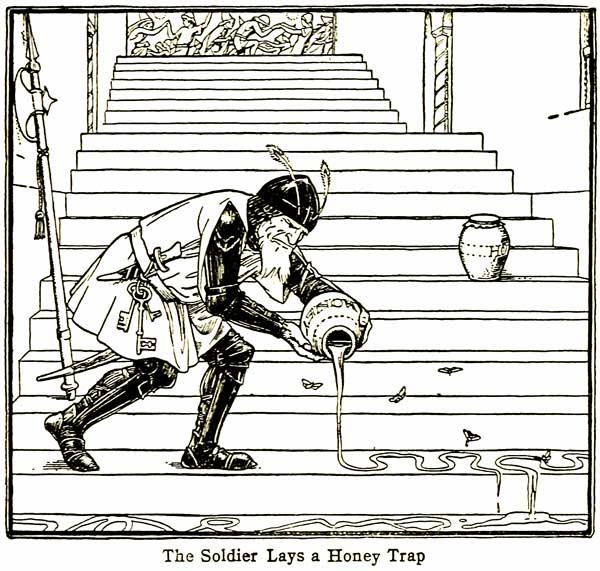
And when her sisters got home they told her once more of the beautiful lady that had come in a silver coach and silver shoon and in a dress all embroidered with flowers: "Ah, wouldn't you have liked to have been there?" said they.
Once again the Prince gave a great ball in the hope that his unknown beauty would come to it. All happened as before; as soon as the sisters had gone Cinder-Maid went to the hazel tree over her mother's grave and called out:
"Tree o'mine, O tree o'meShiver and quiver, dear little tree;Make me a lady fair to see,Dress me as splendid as can be."And then the little bird appeared and said:
"Cinder-Maid, Cinder-Maid, shake the treeOpen the first nut that you see."And when she opened the nut in it was a dress of silk green as the sea with waves upon it, and her shoes this time were made of gold; and when the coach came out of the tree it was also made of gold, with gold trappings for the horses and for the retainers. And as she drove off the little bird from the tree called out:
"Be home, be home ere mid-o'nightOr else again you'll be a fright."Now this time, when Cinder-Maid came to the ball, she was as desirous to dance only with the Prince as he with her, and so, when midnight came round, she had forgotten to leave till the clock began to strike, one—two—three—four—five—six,—and then she began to run away down the stairs as the clock struck, eight—nine—ten. But the Prince had told his soldiers to put tar upon the lower steps of the stairs; and as the clock struck eleven her shoes stuck in the tar, and when she jumped to the foot of the stairs one of her golden shoes was left behind, and just then the clock struck TWELVE, and the golden coach, with its horses and footmen, disappeared, and the beautiful dress of Cinder-Maid changed again into her ragged clothes and she had to run home with only one golden shoe.
You can imagine how excited the sisters were when they came home and told Cinder-Maid all about it, how that the beautiful lady had come in a golden coach in a dress like the sea, with golden shoes, and how all had disappeared at midnight except the golden shoe. "Ah, wouldn't you have liked to have been there?" said they.
Now when the Prince found out that he could not keep his lady-love nor trace where she had gone he spoke to his father and showed him the golden shoe, and told him that he would never marry any one but the maiden who could wear that shoe. So the King, his father, ordered the herald to take round the golden shoe upon a velvet cushion and to go to every four corners where two streets met and sound the trumpet and call out: "O yes, O yes, O yes, be it known unto you all that whatsoever lady of noble birth can fit this shoe upon her foot shall become the bride of his Highness the Prince and our future Queen. God save the King."
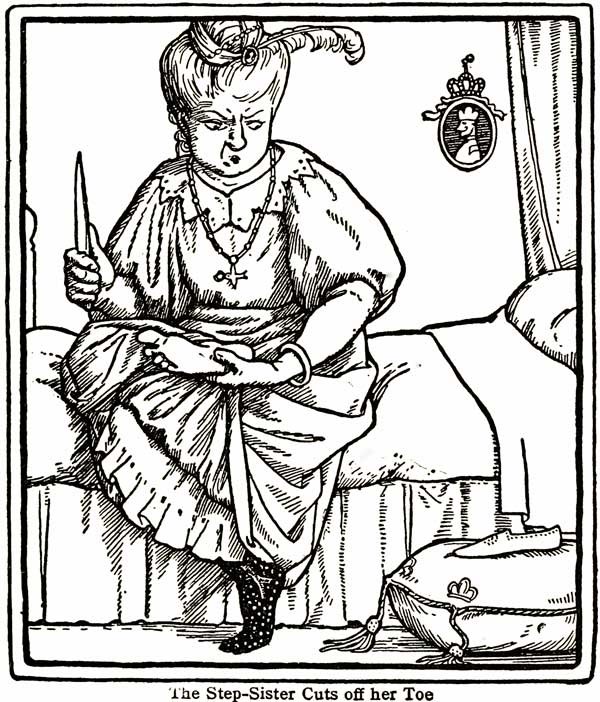
And when the herald came to the house of Cinder-Maid's father the eldest of her two step-sisters tried on the golden shoe. But it was much too small for her, as it was for every other lady that had tried it up to that time; but she went up into her room and with a sharp knife cut off one of her toes and part of her heel, and then fitted her foot into the shoe, and when she came down she showed it to the herald, who sent a message to the Palace saying that the lady had been found who could wear the golden shoe. Thereupon the Prince jumped at once upon his horse and rode to the house of Cinder-Maid's father. But when he saw the step-sister with the golden shoe, "Ah," he said, "but this is not the lady." "But," she said, "you promised to marry the one that could wear the golden shoe." And the Prince could say nothing, but offered to take her on his horse to his father's Palace, for in those days ladies used to ride on a pillion at the back of the gentleman riding on horseback. Now as they were riding towards the Palace her foot began to drip with blood, and the little bird from the hazel tree that had followed them called out:
"Turn and peep, turn and peep,There's blood within the shoe;A bit is cut from off the heelAnd a bit from off the toe."And the Prince looked down and saw the blood streaming from her shoe and then he knew that this was not his true bride, and he rode back to the house of Cinder-Maid's father; and then the second sister tried her chance; but when she found that her foot wouldn't fit the shoe she did the same as her sister, but all happened as before. The little bird called out:
"Turn and peep, turn and peep,There's blood within the shoe;A bit is cut from off the heelAnd a bit from off the toe."And the Prince took her back to her mother's house, and then he asked, "Have you no other daughter?" and the sisters cried out, "No, sir." But the father said, "Yes, I have another daughter." And the sisters cried out, "Cinder-Maid, Cinder-Maid, she could not wear that shoe." But the Prince said, "As she is of noble birth she has a right to try the shoe." So the herald went down to the kitchen and found Cinder-Maid; and when she saw her golden shoe she took it from him and put it on her foot, which it fitted exactly; and then she took the other golden shoe from underneath the cinders where she had hidden it and put that on too. Then the herald knew that she was the true bride of his master; and he took her upstairs to where the Prince was; when he saw her face, he knew that she was the lady of his love. So he took her behind him upon his horse; and as they rode to the Palace, the little bird from the hazel tree cried out:
"Some cut their heel, and some cut their toe,But she sat by the fire who could wear the shoe."And so they were married and lived happy ever afterwards.
ALL CHANGE
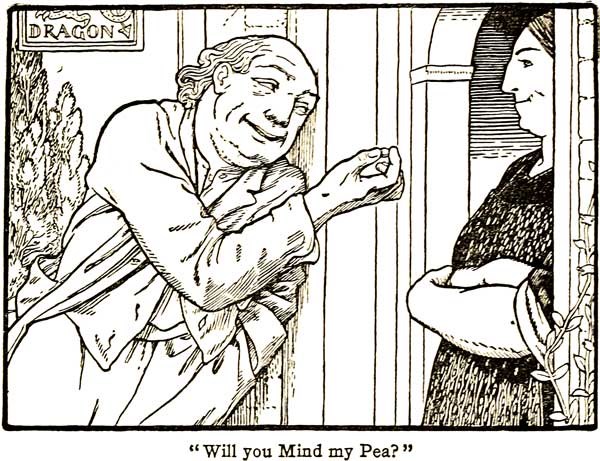
There was once a man who was the laziest man in all the world. He wouldn't take off his clothes when he went to bed because he didn't want to have to put them on again. He wouldn't raise his cup to his lips but went down and sucked up his tea without carrying the cup. He wouldn't play any sports because he said they made him sweat. And he wouldn't work with his hands for the same reason. But at last he found that he couldn't get anything to eat unless he did some work for it. So he hired himself out to a farmer for the season. But all through the harvest he ate as much and he worked as little as he could; and when the fall came and he went to get his wages from his master all he got was a single pea. "What do you mean by giving me this?" he said to his master. "Why, that is all that your labor is worth," was the reply. "You have eaten as much as you have earned." "None of your lip," said the man; "give me my pea; at any rate I have earned that." So when he got it he went to an inn by the roadside and said to the landlady, "Can you give me lodging for the night, me and my pea?" "Well, no," said the landlady, "I haven't got a bed free, but I can take care of your pea for you." No sooner said than done. The pea was lodged with the landlady, and the laziest man went and lay in a barn near-by.
The landlady put the pea upon a dresser and left it there, and a chicken wandering by saw it and jumped up on the dresser and ate it. So when the laziest man called the next day and asked for his pea the landlady couldn't find it. She said, "The chicken must have swallowed it." "Well, I want my pea," said the man. "You had better give me the chicken." "Why, what—when—how?" stammered the landlady. "The chicken is worth thousands of your pea." "I don't care for that; it has got my pea inside it, and the only way I can get my pea is to have that which holds the pea." "What, give you my chicken for a single pea, nonsense!" "Well, if you don't I'll summon you before the justice." "Ah, well, take the chicken and my bad wishes with it."
So off went the man and sauntered along all day, till that night he came to another inn, and asked the landlord if he and his chicken could stop there. He said, "No, no, we have no room for you, but we can put your chicken in the stable if you like." So the man said, "Yes," and went off for the night. But there was a savage sow in the stable, and during the night she ate up the poor chicken. And when the man came the next morning he said to the landlord, "Please give me my chicken." "I am awfully sorry, sir," said he, "but my sow has eaten it up." The laziest man said, "Then give me your sow." "What, a sow for your chicken, nonsense; go away, my man." "Then if you don't do that I'll have you before the justice." "Ah, well, take the sow and my curses with it," said the landlord.
And the man took the sow and followed it along the road till he came to another inn, and said to the landlady, "Have you room for me and my sow?" "I have not," said the landlady, "but I can put your sow up." So the sow was put in the stable, and the man went off to lie in the barn for the night. Now the sow went roaming about the stable, and coming too near the hoofs of the mare, was hit in the forehead and killed by the mare's hoofs. So when the man came in the morning and asked for his sow the landlady said, "I'm very sorry, sir, but an accident has occurred; my mare has hit your sow in the skull and she is dead." "What, the mare?" "No, your sow." "Then give me the mare." "What, my mare for your sow, nonsense." "Well, if you don't I'll take you before the justice; you'll see if it's nonsense." So after some time the landlady agreed to give the man her mare in exchange for the dead sow.
Then the man followed on in the steps of the mare till he came to another inn, and asked the landlord if he could put him up for the night, him and his mare. The landlord said, "All our beds are full, but you can put the mare up in the stable if you will." "Very well," said the man, and tied the halter of the mare into the ring of the stable. Next morning early the landlord's daughter said to her father, "That poor mare has had nothing to drink; I'll go and lead it to the river." "That is none of your business," said the landlord; "let the man do it himself." "Ah, but the poor thing has had nothing to drink. I'll bring it back soon." So the girl took the mare to the river brink and let it drink the water; but, by chance, the mare slipped into the stream, which was so strong that it carried the mare away. And the young girl ran back to her mother and said, "Oh mother, the mare fell into the stream and it was carried quite away. What shall we do? What shall we do?"


